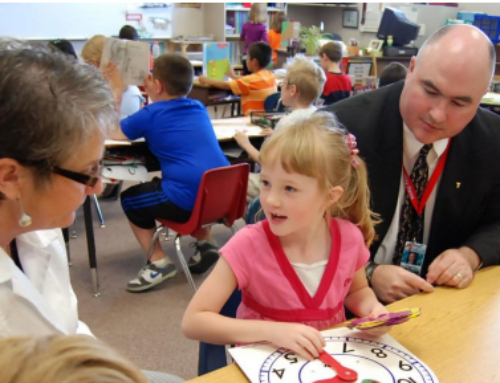 As schools across the country grapple with staff shortages, one state association is tackling the challenge of developing new school leaders head-on. The Illinois Principals Association (IPA) has created the Illinois School Leader Pipeline Program, now in its first year.
As schools across the country grapple with staff shortages, one state association is tackling the challenge of developing new school leaders head-on. The Illinois Principals Association (IPA) has created the Illinois School Leader Pipeline Program, now in its first year.
The program, which not only recruits candidates but also aims to diversify the pool of school leaders, is currently supporting 100 aspiring school leaders—most of whom started their administrator preparation programs at various colleges or universities in the fall—with generous tuition support of up to $2,500 per semester, mentoring from an experienced school leader, and funds for their schools to offset the cost of substitutes so they can take time off from their current teaching jobs for leadership activities. In addition, all the candidates are now Aspiring Members of the IPA (a membership category that includes all benefits except liability insurance).
Data gathered by the IPA shows just how much the principal pipeline has dried up in recent years. In Illinois, the numbers of people completing all requirements to become a principal dropped more than 75% between 2011 and 2020, from 2,637 to 626. That decrease means there are simply not enough candidates to meet the demand for open administrative positions in the state, totaling more than 70 principals and assistant principals as of this fall.
A Strong Commitment From the State
To administer the pipeline program, IPA is partnering with the Illinois Council of Professors of Educational Administration and the Black Educational Advocacy Coalition, with financial support from the Illinois State Board of Education.
The program has been attractive from the start, drawing 275 applicants for its first round. Candidates had to submit a résumé, a narrative about why they should be selected, and references. A committee from IPA and partner organizations chose the top 100 as participants. In addition to gaining acceptance to a state-approved principal preparation program, the candidates must complete all the requirements to become a principal and commit to becoming a principal, assistant principal, dean, or other school leader after they are certified.
“I’ve been at this for quite a while, and I think it’s the first time we’ve tried anything like this in Illinois,” says IPA Executive Director Jason Leahy. “This type of commitment from the state is what’s going to get us back to where we need to be with the number of school leaders who are highly prepared and ready to take on the challenges and opportunities of school leadership in our state’s schools.”
The IPA pipeline candidates are far more diverse that the state’s current school leaders, 77% of whom are white. Of the 100 participants, 47 are white, 26 are African American, 20 are Hispanic, and the rest are Asian, Native American, or mixed race. Three-quarters are female, and there is a balance of educators from urban, suburban, and rural districts. So far, 18 different colleges or universities across the state have enrolled students in the program.
Diverse Candidates Eager to Serve
While the candidates are all currently working as educators, they bring very different backgrounds and perspectives to the program.
Luz Rangel Raymond is a bilingual interventionist at Graves Elementary School in Summit, working with students in the general education population. On top of that, she’s a school board member at her daughter’s high school and president of the local teachers’ union. That juggling of multiple roles, including completing her principal preparation classes, is typical of many of the candidates.
Raymond, who is enrolled at Southern Illinois University, says she was inspired to enroll in the IPA program because of her admiration for her current principal, Guillermina Arteaga, and her desire to put her ideas about her school and education into practice. “I realized the only way I can really do that is if I’m an administrator,” she says.
Raised in Mexico, Raymond didn’t speak any English when her family moved to the United States when she was 12. Through her work, she loves connecting with the local Latino community and showing current immigrants what’s possible. “I would love the opportunity to have students look up to me,” she says. “I will be able to tell any child, whether they are born here or not, that when you want to do something, it’s important to find a way to do it even when you think you can’t.”
Andrea January is an AVID program coordinator and teacher at Thornton Township High School in Harvey. “I just realized that teachers, as wonderful as some may be, can affect their classroom, their kids, and their kids’ friends. But the building leader affects so much more in that building,” says January, who is enrolled at Governors State University. She’s also inspired to follow the example of family members who are educators, including an aunt who was a longtime principal in Chicago Public Schools.
January’s school is in the suburbs, with many students from low-income families. Low-income schools, she says, are sometimes very neglected. “They keep going further down, having fewer and fewer resources and fewer and fewer opportunities for the students,” she says. “We have our financial challenges, but we’re fortunate that our district has provided the funds for various academic programs (such as AVID), a number of extracurricular activities, and has started providing Chromebooks for each student.”
Like Raymond, she also appreciates the program’s aim of accepting candidates who look like the students in their schools. “It goes back to the saying that you can’t be it unless you see it,” says January, who is African American. “It’s not that folks of other ethnicities can’t teach the others, but sometimes it’s good for them to know you’re somebody who has been through what they’ve been through or lived in the same way they have to live. It can give [students] more confidence that they can do it, too.”
Helping Kids Achieve Their Dreams
Alex Washam, a social studies teacher in the rural Meridian School District in Mounds, might have the most unusual background of any of the candidates. Now in his fourth year of teaching, Washam never planned to go into teaching. He had a master’s degree in athletic administration, but when jobs in that field didn’t pan out, he took a job as a custodian at the school where he now teaches. When a new administrator came in and discovered Washam had a master’s degree, he was offered a job as a substitute and then as a full-time teacher.
“I fell in love with it,” says Washam, who went back to school at Grand Canyon University in Phoenix, AZ, to earn his degree in education and his certification. “I want to help kids pursue their dreams. And I feel like I have a good opportunity to do that as an administrator.”
As is true for many of the candidates, the fact that the program basically pays all of their expenses made it possible for Raymond, January, and Washam to enroll in their administrator preparation program, or at least made life much easier. “If I hadn’t gotten this grant through the pipeline program, there’s no way I would have been able to make it work,” says Washam, who is now enrolled at McKendree University.
Raymond, January, and Washam all have ideas and preferences about where they would like to work as administrators once they finish the program, but they realize their first administrator position might not match those desires.
Washam has an especially strong attachment to his school. He went there himself, his mother taught there for 39 years, and he now teaches many students who are the children of the people he went to school with. “I would like to stay here in Meridian if everything works out. If not at the time I graduate, maybe I can get back here later.”
The IPA’s Leahy sees how important programs like Illinois’ are to the future of the state’s schools. “We have to get serious about providing support, from aspiring principals up through mastery level, if we’re going to have school leaders stay and battle this terrible attrition that we’re dealing with,” he says. “If we don’t train them and keep them in positions, the research is pretty clear that we won’t get the outcomes for young people that we want from our schools.”
Written by Dan Gursky for Principal Leadership Magazine. View the original story here.
For more on the Illinois School Leader Pipeline Program, visit ilprincipals.org/illinois-school-leader-pipeline-program.




